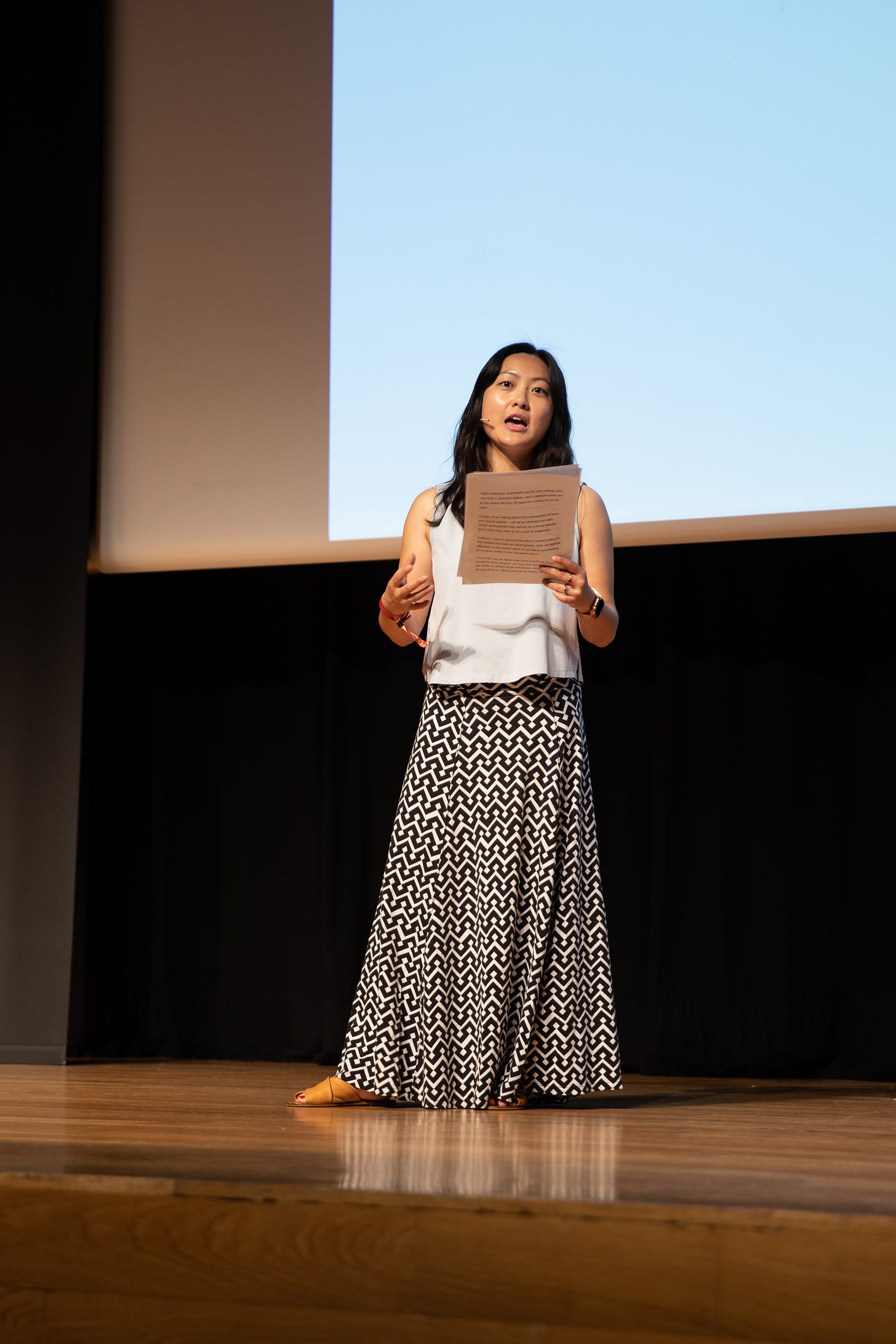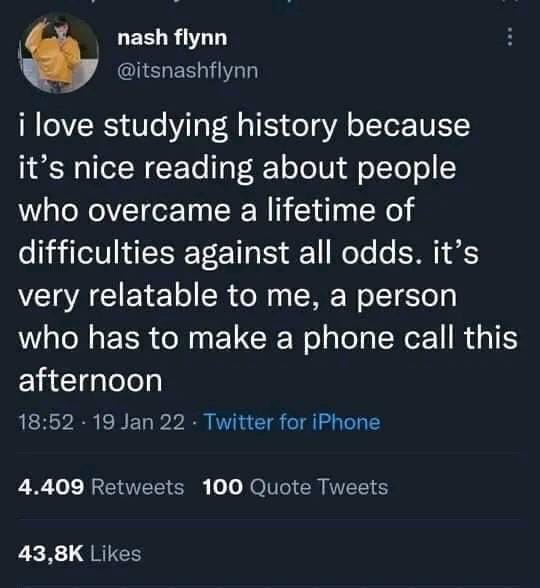Social justice is about people
My World's 50 Next speech (lol) & more thoughts on awards culture
Hi, I know it’s been a while.
At first, I was slow to write this newsletter because of just how much chaos was going on in my life between work, school, and moving cross-country (for the 6th time!) When I finally restarted my (still unfinished) piece on Unforced Errors, Underutilized People, the ruling on Roe v. Wade came in and I was emotionally unable to do much. After utilizing excuse after excuse (to be fair, I have been cooking at a chef residency for the past two weeks), I figured it’s time to ease myself back into thinking aloud and spreading ideas of change into the world, since staying disheartened and silent does no one any good at all.
To start, I’m sharing my speech for the World’s 50 Next before I dive into further thoughts on awards culture. It is about power hoarding and the problems inherent in awards culture, and was delivered completely un-ironically in the extremely ironic setting of a stage in Bilbao, Spain in front of a bunch of people who decide the World’s 50 Awards every year inside a total black box. (Here’s some information on World’s 50 Next if you’re not familiar; it’s run by the same organization that does the World’s 50 Best Bars & Restaurants, so it could not be more fitting that this year’s newly unveiled W50 Best Restaurants list is as out-of-touch as ever.)
Social justice is about people
Today, I’ll be talking about the intersection of food and social justice — not as an abstract concept, which enthusiasts may uphold as a moral identity and critics may refer to as a cult of wokeness.
Rather, I want to ground the idea of social justice in the people that fuel our food system, and call special attention to the power each of us has in contributing to broader shifts in the industry’s future.
I think we can all agree that food is political. Food fundamentally shapes not only who we are but how we relate to others at an individual, community, and structural level. When we look at history, food is consistently one — if not the — primary driver in shifts of human behavior.
For example, when we needed to extract nutrients from land that could not otherwise feed us, we completely changed our relationship with animals to raise cows that turned grass into useful milk and butter. The desire for sugar, spices, and tea kickstarted the trans-Atlantic slave trade and colonialism, forever changing relationships at a geopolitical level.
Food is also central to how we socially and politically segregate groups of people. What, how, and where people eat can be used to portray them as foreign, barbaric, low-class, or refined, tasteful, and luxurious.
Think about the bat soup video that went viral at the start of 2020, even though it had nothing to do with COVID’s actual origins. Even if it was not stated outright, the framing and representation of the video in Western media made it quite clear the underlying message was that the Asian diet is not only disgusting, it’s dangerous to society. What does this, then, imply about Asian people and how we should treat them?
While food forms the basis of all these examples, the throughline I really want to highlight here is power. Food has always served as an essential mechanism for control. When white settlers forced Indigenous folks off their ancestral grounds, they not only stole their land, but the food generated from that land and the foodways they’ve learned through that land.
So when we talk about the politics of food, it is critical to reflect on the complex web of relationships — past and present — that has produced the system we live in today. And if we are to strive for social justice in food, we must grapple with the very real, pressing need to reshape these relationships to care and nourish for the people within them.
The challenge is, everyone here, myself included, benefits in some capacity from existing systems staying exactly the way they are. I recognize how much love, labor, and pain everyone here has gone through to be able to command the power they have today and how threatening or even counterintuitive it feels to advocate for change that seems like it may undermine our place in the world.
But herein lies a great misunderstanding around what it means for those with power to push for radical change. The system we live in today, built on the backs of colonialism, imperialism, and capitalism, has conditioned us to build relationships that utilize power in only one way.
We know this as “power over,” or coercive power that demands from the top-down, myopic to only the needs of those privileged or loud enough to be heard. Lesser celebrated is “power with,” the vision championed by management philosopher Mary Parker Follet.
All the way back in 1924, she wrote, “Leadership is not defined by the exercise of power but by the capacity to increase the sense of power among those led.”
Put in today’s context, the goal of so-called “radical” social justice movements is not the absence of power or lack of systems, but a reformulation of power to one that is circular and regenerative, so together, we can co-create new systems that are rooted in self-determination, not hierarchy.
When I talk about systems, I recognize that it can sound intimidating and out of reach, so I want to situate the concept, again, in people. Systems-based change is more than just galvanizing many people to action at once. It’s about creating movements that outlast ourselves, and enabling those that are currently kept on the margins to be the new foci of our industry.
To start doing this, I’d like to put forth what some may find a controversial stance: that those of us here are not, and should not, be the center of the food ecosystem if we are to change it for the better. With the power we already have, our responsibility is to see beyond ourselves and redistribute this power by truly, boldly investing in others.
It means to ask ourselves, who am I in relationship with that I commit to earnestly dedicating the time to uplift so that they are in my seat at the World’s 50 next year? As an awards organization, it means a pronounced shift to scrutinize industry leaders not just on their output regarding food or innovation but their ability to care for their staff and cultivate new leaders.
The incomparable bell hooks wrote, “The practice of love offers no place of safety.” This encapsulates both the beauty and contradiction inherent in social justice work. It asks us to be vulnerable enough to see each other with not only critical clarity but also with great kindness.
The food system as it stands today has given us all so much, it’s only natural we want to hold onto it for as long as possible. But when you love something, you must also be willing to tear it all down and start anew.
This is the love I hope we can all reach within ourselves and connect with, as we face the reality that we have each benefited from this unjust system for a very long time, and believe ourselves brave enough to venture into unproven, uncomfortable new depths in order to change it.
Some more thoughts on awards culture
After I received an award from Thrillist in 2020, I wrote on IG that:
We should challenge the idea of “individual” achievement. Dig into any award winner & you’ll find a team propelling them forward. That could be a work team in the traditional sense, or it could be the labor of care — the partners who put your ambitions first, the nanny that frees up your day, the friends who keep you energized. (It is not an accident men are generally award recipients while care-based roles fall on BIWOC.)
Not to mention, what is “worthy” of being granted an award? We've been indoctrinated to recognize “value creation” only in certain situations (e.g., the reason DoorDash has just IPO’ed for billions but the restaurants on their platform are shuttering). Our ideals around “improvement” and “forward progress” focus on a narrow definition of innovation vs. creating holistic and sustainable processes (e.g., celebrating chemical-based “breakthroughs” for soil health instead of rebuilding the ecosystems nurtured by Indigenous tribes).
Second, the ability to be “top of mind” for the award curators is highly correlated with media exposure. As I’ve covered in my Washington Post piece, access to press draws upon many privileges — social capital, generational wealth, free time, etc. Many awards also require an entry fee OR a nomination from someone within that award’s “world.” How much are we really scrutinizing the decision-makers behind the awards — especially those who do (and do not) have ready access to them?
This year, I received another few awards — Food & Wine’s Game Changers, World’s 50 Next, and Well+Good’s Change Makers — and while I’ve noticed that overall the people being awarded may be looking more diverse (great!), the system itself looks more or less the same. There is still very little transparency as to how the judging criteria work, and how exactly the judges are trained to be appropriately impartial, critical, and thorough. Right now, judges aren’t being trained at all — in fact, from the off-record conversations I’ve had with actual judges for major awards, I’ve learned they receive bare-bones information (2-3 paragraphs) about the nominees, no real instruction or time to do due diligence before being asked to vote.
It pains me that we still have no model of due diligence as part of the nomination process. In the face of a 3-part exposé of the “acclaimed” and multiple award-winning Blue Hill at Stone Barns, how many more times does it need to be made clear that workers need to be interviewed before their managing chefs and businesses receive money, awards, press, and accolades?
To date, not a single person on my tiny team at Studio ATAO has been interviewed for any of the awards I received. That makes zero sense, especially when my category for recognition revolves around social justice. When I asked someone at the James Beard Foundation about this glaring discrepancy, they responded that the Foundation has an ethics hotline (it does) that no one knows about workers could submit a complaint if there was an issue with one of the award nominees. This is the reactionary politics of awards culture at its peak: putting the onus of due diligence on the folks with the least power and most disadvantageous position if ugly truths were to be made public.
Yes, there will be difficulties in maintaining worker confidentiality if full-scale team interviews were to be launched. But if this process were normalized, then contact information could be required to be handed over to awards committees before nominees are ever notified of their status to avoid potential conflicts of interest and/or acts of retaliation. Even in an imperfect implementation stage, a requirement of worker interviews would still be objectively better than the due diligence that exists today, which apparently doesn’t even include a Google search. (See: Kim Bartmann receiving a nomination for “Best Restauranteur” after being investigated for wage theft.)
Where does that leave us? Well, as I wrote in my speech above, it asks all of us to look beyond the benefits we may be receiving at any given time to continue to demand systems-based change. It’s about creating movements that outlast ourselves. It’s about redistributing power. (And yes, all of that can happen in tandem with celebrating this year, next year’s award nominees and winners.) It also means we need to reevaluate the proxies we’ve created to recognize and label “good food.” As Alan Sytsma just wrote for Grub Street:
More than anything, the “World’s 50 Best” list as it currently stands promotes the antiquated Chef’s Table fantasy celebrating the tradition that creative expression and luxury values should trump all other considerations, including the health of the people who provide those meals. Here’s a counterpoint: What if these are not the qualities that necessarily create the objectively best dining experiences?
Weekly Meme Roundup

Personal Things From This Week
Listening to: the theme song from A Dream of Splendor
Watching: Literally nothing after tiring of A Dream of Splendor after 21 episodes
Reading: All the emails I’ve missed during the last 2 weeks as I’ve been doing a chef residency at J Vineyards
Eating: Afghan Kitchen in Salt Lake City, UT (day 2 of my cross-country trip!)
Drinking: Lots and lots of water in the car
Nice thing I did for myself this week: Started writing some vows to myself after being inspired by my brilliant friend Risa Puno









🥇🏆🎗